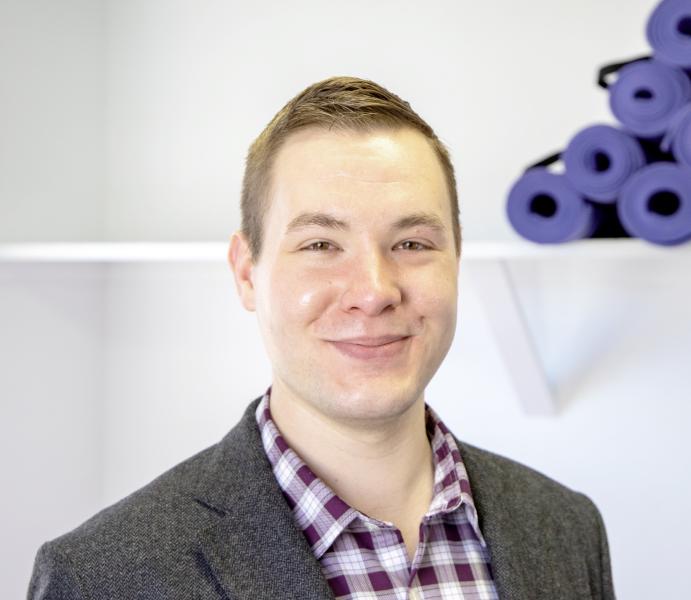Northern Michigan University 2013 alumnus Dr. Mitchell Stephenson applies experiential teaching approaches he learned from his NMU sports science faculty mentors to his role as an associate professor of Health & Human Performance at the University of Montana Western. The certified strength and conditioning specialist's academic and government-sponsored biomechanics research is focused on methods to improve human performance and reduce injury rates in sport and military environments. Stephenson also consults federal agencies and is currently in Ukraine directing a U.S. initiative to provide safety and security for humanitarian efforts. NMU recently recognized his impressive achievements since graduating a decade ago with its Outstanding Young Alumni Award.
“Before the war started, I had never been to Ukraine,” Stephenson said during a phone interview. “I support government and non-government entities in security of aid efforts in areas of strife. One of the things I do in Montana is train individuals on how to be able to function well in non-compliant environments related to war, weather-related evacuations and other situations. I do arctic operations training for a variety of organizations in the 10,000-foot Montana mountains, where I love to backpack, to enhance physical performance and their ability to cognitively perform in arduous environments.”
Stephenson's mother attended NMU and his parents lived in Marquette for a period before he was born. As a high school senior in Atlanta, Mich., he applied to several universities—mainly in lower Michigan—but also participated in NMU's annual Presidential Scholars competition. He said 24 students were selected to receive the full-ride Harden scholarship that year, but he was number 25.
“After they called to say I didn't get the scholarship, I accepted another full ride with a different university,” Stephenson said. “A call came from NMU two weeks later that I got the Harden after all because someone declined it. I debated where to go, but Northern's environment and culture captured my attention. In the end, I chose Northern because of my Freshman Fellow faculty adviser, Randy Jensen. We're still astoundingly close; he's like a father figure. I even had him come to my university for the seven-year review of our program. Both Randy and Phil Watts demonstrated the resources Northern provides and the opportunities they could support that allow students to excel if they're willing to put in the work. That's the same approach I use in Montana.”
With the popularity of rodeo in western Montana, some of Stephenson's research with students has focused on the prevalence of ACL injuries among female goat-tying athletes. The University of Montana Western implemented a block schedule in the Health & Human Performance program. Students take one four-credit class at a time and complete it within a month. Every course is experiential, with students performing practices of their disciplines. Stephenson describes it as a “total immersion model,” the same one employed by his NMU professors. He accepted the position at UMW because of its emphasis on fully immersing students in their education.
“It is astoundingly unique in academia. Our program is younger than Northern's—only eight years—but I wanted to create the same type of environment that sets up students for success. Research experience at NMU also set me up for success. Sports science and its subdisciplines are evidence-based via peer-reviewed publications. Students elsewhere may read publications, but not necessarily contribute to the field's knowledge. At NMU, we did contribute as researchers and authors of our own publications. That approach is critical to all of the pedagogy here at UMW as well. If you had told me in 2009 that my career as professor would be impacted so much by my undergraduate adviser… . It's a gift that keeps on giving, and now I'm positively influencing students here.”
Stephenson gravitated toward sports science as a major, in part because he was a professional motorcycle racer and hoped to learn how to improve his training program and reduce the risk of injury. He met his wife, NMU alumna Ashley LeMaire, through motorcycles. His dad rode them as well and hoped that his son's educational path might lead to a solution for compartment syndrome, in which pressure rises in and around the arm muscles, possibly limiting the flow of blood, oxygen and nutrients to the nerves and muscles. While Stephenson was not able to fulfill his dad's wish, NMU prepared him well for his roles as an educator, researcher and collaborator beyond academia.
He also holds a master's from the University of Wyoming and a doctorate from Iowa State, but Stephenson said his experience at Northern impacted him for his career “much more profoundly” because he had mentors beyond the Health & Human Performance program.
“The director of the Honors Program, Michael Broadway, was the first person to convince me to travel internationally. I went on a faculty-led study abroad program to Sweden and later presented research in Portugal and Australia. The next director, David Wood, integrated liberal arts and the sciences to make me a more well-rounded individual. The Student Leader Fellowship Program gave me an opportunity to practice leadership without already being in that role and essentially jump-starting those skills. Overall, I learned flexibility and adaptability at Northern—qualities I now rely on to create connections with people.
“I can't thank NMU or individuals there enough for shaping my entire career. I hold that place in the highest regard and am astoundingly honored to receive this award. It is truly heart-touching and reinforces my commitment to the fact we can do well to positively impact the world.”

